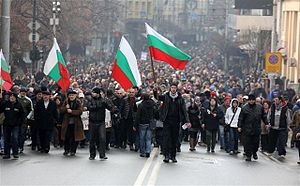2013 Bulgarian protests against the first Borisov cabinet
| 2013 Bulgarian protests against the first Borisov cabinet Протести срещу кабинета „Борисов“ |
|||
|---|---|---|---|

Protest in Sofia, 17 Feb 2013
|
|||
| Date | 28 January 2013 – 16 March 2013 | ||
| Location | Bulgaria (main) Austria, France, Germany, Greece, United Kingdom, Spain (Bulgarian diaspora) |
||
| Caused by |
|
||
| Methods | |||
| Resulted in | Resignation of the cabinet; Raykov government takes power; early Parliamentary elections; reductions in energy prices; increase in pensions; government support (41 million leva) for the poorest segments of the population | ||
| Number | |||
|
|||
| Casualties | |||
| Death(s) | 5 | ||
| Injuries | 24 | ||
| Arrested | dozens (according to unofficial estimates), 60+ (based on police sources) | ||
The 2013 Bulgarian protests against the first Borisov cabinet were civil demonstrations against high electricity and hot water bills resulting from monopolism in the sphere that began in Blagoevgrad on 28 January 2013, subsequently spread to over 30 cities in Bulgaria and ended with the resignation of Boyko Borisov government on 20 February 2013. They were caused by abnormally high electricity bills, but later turned into a mass non-partisan movement against the government and the political system. The events were marked by seven self-immolations (five of them fatal), spontaneous demonstrations and a strong sentiment against political parties.
As a result of the demonstrations, the centre-right government of Boyko Borisov resigned and a caretaker cabinet led by Marin Raykov was appointed. The demands of protesters, however, were not addressed, and demonstrations continued throughout the country, calling for a change of the political model and nationalisation of strategic economic sectors.
Electrical power distribution in Bulgaria was managed by a state-owned monopoly until 2005, when the government sold 67% of it to three foreign power companies - German E.ON, Austrian EVN Group and Czech ČEZ Group. In 2011, E.ON sold its Bulgarian branch to Energo-Pro, a private Czech power company, and on the next year the state sold its stakes in CEZ. EVN, ČEZ and Energo-Pro virtually operate as private regional monopolies whose activities are overseen by the State Commission for Energy and Water Regulation (SCEWR). The state also sold its power distribution infrastructure to these private distributors, thus losing control over the management of profits. The main energy companies are believed to have acquired debts in the four years preceding the demonstrations, which partly contributed to a rather unbalanced situation in the energy sphere. In addition, residents of Sofia have been voicing their concerns for years against the city's district heating provider – Toplofikatsiya Sofia, which has a monopoly on heat distribution in the city. Discontent has been created by very high prices and the fact that the company only reviews readings from customers' calorimetres once a year and the rest of the time it forms bills using "estimates", the complex and allegedly illegal formulas the company uses for calculating the bills and the lack of accountability and the practices of the so-called "heating accountancy firms", which act as middle-men between Toplofikatsiya and its customers.
...
Wikipedia
